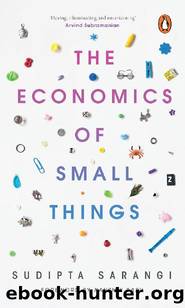The Economics of Small Things by Sudipta Sarangi

Author:Sudipta Sarangi [Sarangi, Sudipta]
Language: eng
Format: epub
Publisher: Penguin Random House India Private Limited
Published: 2020-11-23T00:00:00+00:00
Facebook against Corruption
In December 2010, a wave of powerful protests erupted in many Arab countries. Now termed as the Arab Spring, this tumultuous event really shook the world. It saw ordinary people take to the streets to fight against oppressive regimes on the strength of mere human spirit. The Arab Spring led to the demise of many dictatorships, including those in Egypt, Libya, Tunisia and Yemen. Other countries, like Bahrain and Syria, observed serious civil uprisings; even Iraq, Jordan and Kuwait did not escape turmoil.
Fast forward to 2011, a protest, led by the social activist, Anna Hazare, shook India. This time, the protest was against corruption. Millions of people, primarily the youth that were fed up with corruption scandals making headlines on a regular basis in India, joined the protest at Jantar Mantar in New Delhi. The protest was so successful that one of the key lieutenants of Anna Hazare, Arvind Kejriwal, was able to become (and continues to be) the chief minister of Delhi by forming a new political party with a primarily anti-corruption agenda. In fact, Time magazine featured these protests as one of the top-ten stories of the year.
Why Social Media?
Social media had a significant role to play in the success of these movements by providing (i) a means for rapid communication, (ii) unique opportunities for interaction among the protestors and (iii) a personal touch. As I learned from a colleague of mine, the recent protests in Hong Kong did indeed rely on these three aspects: there was no single leader driving the movement. Social media provided a platform where group discussions drove decisions regarding the protests by a large group of people. Moreover, social media platforms ensure rapid communication that can simultaneously reach a large group, allowing protesters to be agile and stay ahead of their rivals. Prior to the Arab Spring, given the sheer gap between the ruling elites and the lay public, political pundits in Egypt were anticipating street discontent. It is social media that accelerated this process. In Tunisia, the social networking sites actually provided the initial spark by allowing for quick dissemination of information and feedback. As an Egyptian protestor succinctly summarized it, âWe use Facebook to schedule the protests, Twitter to coordinate and YouTube to tell the world.â
In India as well, social media was arguably the key ingredient in the success of the anti-corruption movement: it was hardly a secret that young India, with a greater exposure to the world (made possible by both technology and improvements in education facilities), was frustrated with corruption and willing to act on it. The organizers and the supporters of the movement took advantage of this knowledge to connect easily and quickly with like-minded people, and to coordinate about the venue and timing of the protest for maximum visibility and impact. Finally, the large user base of social media implied a bigger audience with whom news regarding corruption could be shared rapidly.
For organizing a protest, what is even more important is the source of information:
Download
This site does not store any files on its server. We only index and link to content provided by other sites. Please contact the content providers to delete copyright contents if any and email us, we'll remove relevant links or contents immediately.
International Integration of the Brazilian Economy by Elias C. Grivoyannis(100423)
The Radium Girls by Kate Moore(11985)
Turbulence by E. J. Noyes(7987)
Nudge - Improving Decisions about Health, Wealth, and Happiness by Thaler Sunstein(7668)
The Black Swan by Nassim Nicholas Taleb(7068)
Rich Dad Poor Dad by Robert T. Kiyosaki(6534)
Pioneering Portfolio Management by David F. Swensen(6263)
Man-made Catastrophes and Risk Information Concealment by Dmitry Chernov & Didier Sornette(5961)
Zero to One by Peter Thiel(5742)
Secrecy World by Jake Bernstein(4709)
Millionaire: The Philanderer, Gambler, and Duelist Who Invented Modern Finance by Janet Gleeson(4428)
The Age of Surveillance Capitalism by Shoshana Zuboff(4256)
Skin in the Game by Nassim Nicholas Taleb(4211)
The Money Culture by Michael Lewis(4147)
Bullshit Jobs by David Graeber(4147)
Skin in the Game: Hidden Asymmetries in Daily Life by Nassim Nicholas Taleb(3966)
The Dhandho Investor by Mohnish Pabrai(3730)
The Wisdom of Finance by Mihir Desai(3703)
Blockchain Basics by Daniel Drescher(3545)
